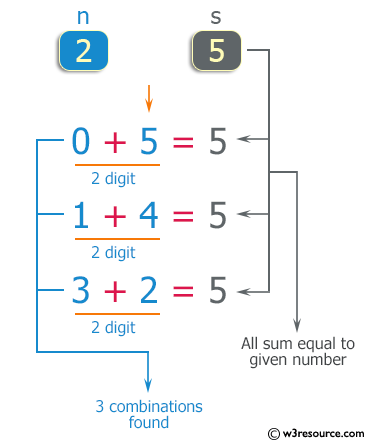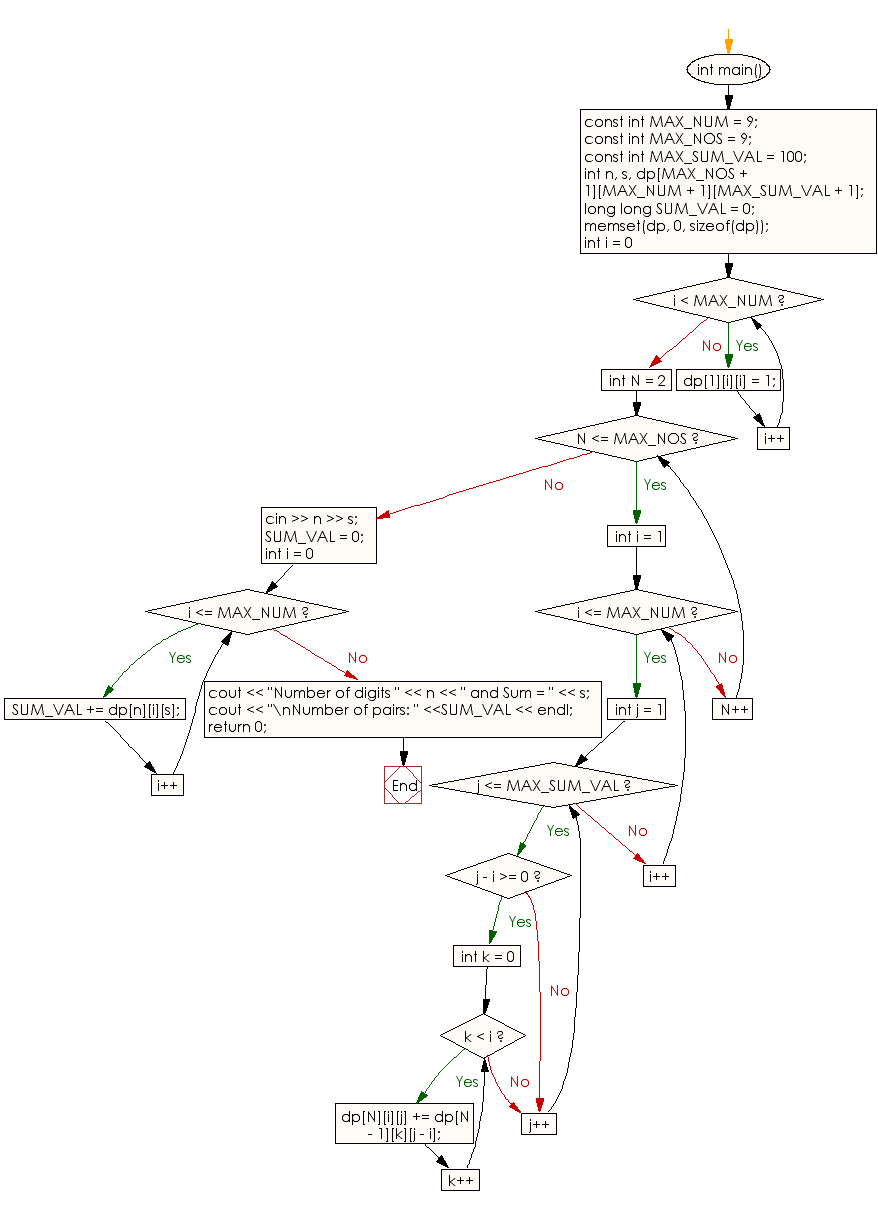C++ Exercises: Counts the number of combinations where the sum of the digits equals to given number
Digit Combinations with Given Sum
Write a C++ program that reads n digits chosen from 0 to 9 and counts the number of combinations where the sum of the digits equals the given number. Do not use the same digits in a combination.
For example, the combinations where n = 2 and s = 5 are as follows:
0 + 5 = 5
1 + 4 = 5
3 + 2 = 5
Visual Presentation:

Sample Solution:
C++ Code :
#include <string.h> // Header file for string manipulation
#include <iostream> // Header file for input/output stream operations
using namespace std; // Using the standard namespace
int main()
{
const int MAX_NUM = 9; // Maximum number of digits
const int MAX_NOS = 9; // Maximum number of sets
const int MAX_SUM_VAL = 100; // Maximum sum value
int n, s, dp[MAX_NOS + 1][MAX_NUM + 1][MAX_SUM_VAL + 1]; // Declaration of variables and an array for dynamic programming
long long SUM_VAL = 0; // Initializing SUM_VAL as a long long variable
memset(dp, 0, sizeof(dp)); // Initializing the 'dp' array to 0
// Initializing dp array for base case of single digits
for (int i = 0; i < MAX_NUM; i++)
{
dp[1][i][i] = 1;
}
// Dynamic programming to calculate the number of ways to form numbers with given sum and number of digits
for (int N = 2; N <= MAX_NOS; N++)
{
for (int i = 1; i <= MAX_NUM; i++)
{
for (int j = 1; j <= MAX_SUM_VAL; j++)
{
if (j - i >= 0)
{
for (int k = 0; k < i; k++)
{
dp[N][i][j] += dp[N - 1][k][j - i];
}
}
}
}
}
cin >> n >> s; // Input for number of digits and required sum
SUM_VAL = 0; // Reset SUM_VAL to 0
// Calculating the total number of pairs satisfying the given conditions
for (int i = 0; i <= MAX_NUM; i++)
{
SUM_VAL += dp[n][i][s];
}
// Outputting the result
cout << "Number of digits " << n << " and Sum = " << s;
cout << "\nNumber of pairs: " << SUM_VAL << endl;
return 0; // Indicating successful completion of the program
}
Sample Output:
Sample Input: 2 5 Number of digits 2 and Sum = 5 Number of pairs: 3
Flowchart:

For more Practice: Solve these Related Problems:
- Write a C++ program to count all unique combinations of n digits (0-9) that sum to a given value without repetition.
- Write a C++ program that generates and prints all digit combinations where the sum of digits equals a specified value, ensuring no digit repeats.
- Write a C++ program to determine the number of unique combinations of digits that add up to a target sum using backtracking.
- Write a C++ program that accepts n and s, then finds and displays each combination of distinct digits that sum to s using recursion.
Go to:
PREV : Find Mode in Sequence.
NEXT : Sales Total and Average Quantity.
C++ Code Editor:
Have another way to solve this solution? Contribute your code (and comments) through Disqus.
What is the difficulty level of this exercise?
